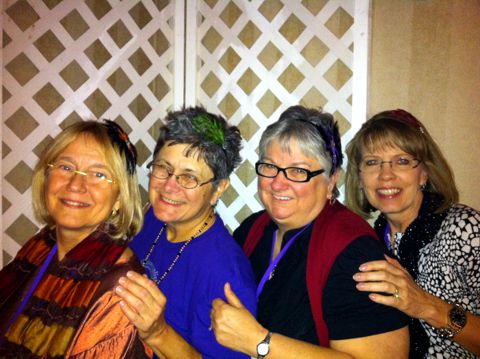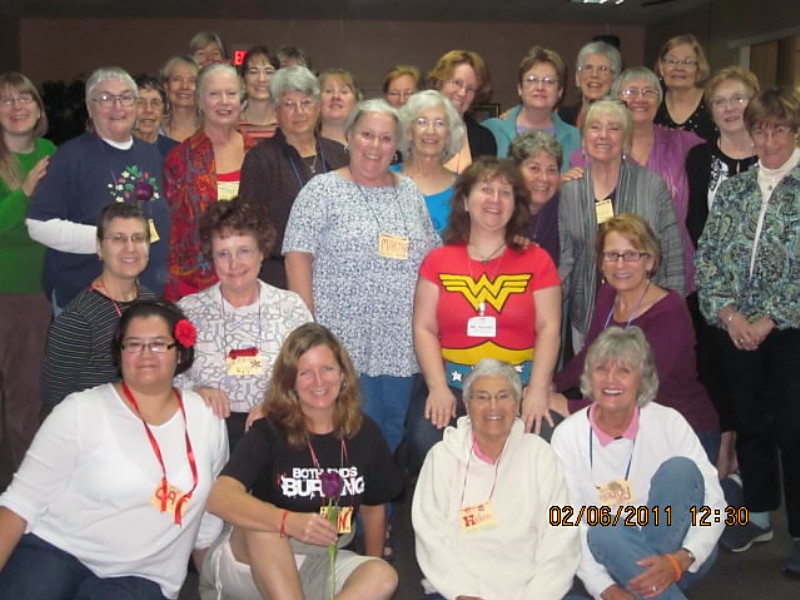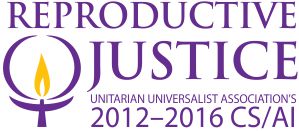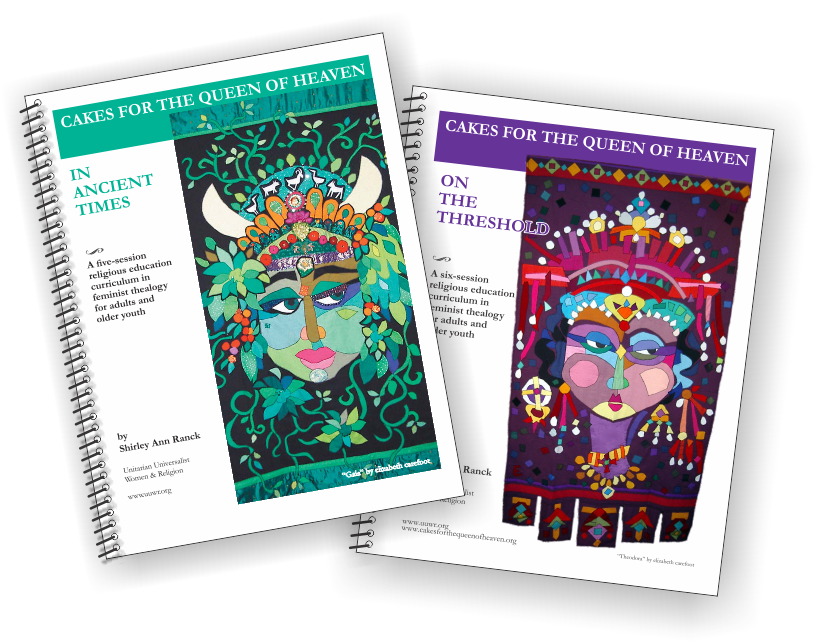Revolutionize and Mutualize People Power
... Our Spring 2011 Theme ...
Our W&R work is in the flow of the worldwide coming together for interdependence and freedom. The human evolution of our going to this partnership level of empowerment makes our W&R movement ever strong.
SW UU Women's Conference
 SouthWest UU Women held their 25th annual Conference, "Generation NEXXT" in Dallas Texas on March 3-5. Despite their keynote speaker having to cancel at the last minute due to family illness, the SWUUW women were up to the challenge. Participants commented:
SouthWest UU Women held their 25th annual Conference, "Generation NEXXT" in Dallas Texas on March 3-5. Despite their keynote speaker having to cancel at the last minute due to family illness, the SWUUW women were up to the challenge. Participants commented:
"Big Bad Gina ROCKED! It was so fun to dance to their music, and just be entertained by them!"
"I thought Intern Rev. Megan [Dalby-Jones] did a very good job of delivering the message that Rev. Tambra Lebak was to have given."
Shirin Neshat, Iranian Film Director
 Islamic women are powerful ladies drawing on powerful mythological sources. My favorite is Shirin Neshat (1957-), from Iran. I just watched a film directed by her, Women without Men, which is available through Netflix. The surrealistic film is based on a surrealistic novella by Shahrnush Parsipur (translation available from Syracuse University Press, 1998)
Islamic women are powerful ladies drawing on powerful mythological sources. My favorite is Shirin Neshat (1957-), from Iran. I just watched a film directed by her, Women without Men, which is available through Netflix. The surrealistic film is based on a surrealistic novella by Shahrnush Parsipur (translation available from Syracuse University Press, 1998)
Neshat’s story is about four women living in 1953 when a coup ousted the President Mohammed Mosaddeq in favor of Mohammad Reza Shah Pahlavi. (In case you haven’t heard of Mosaddeq, and I had to look him up, he was an elected leader in Iran, who the CIA and the British intelligence deposed, putting in the Shah of Iran with his repressive reign. And that is only one of the reasons the people in the Middle East are angry at the U.S. and Britain.)
One woman is a communist; one is a prostitute; one an older women who had been a singer, but her husband didn’t allow her to sing; and the last is a woman who is concerned about the importance of virginity.
Response to Cakes for the Queen of Heaven, Isis
 Making connections is so important. Women weaving the web of life remind us to connect the difficult past with present struggles and give birth to hope in a more peaceful and just future.
Making connections is so important. Women weaving the web of life remind us to connect the difficult past with present struggles and give birth to hope in a more peaceful and just future.
Back in the early 1980s, I remember questioning the traditional mythology presented at my son’s Waldorf school, mythology that told of war as inevitable. Weren’t there any powerful, responsible women who might come up with better solutions to conflict, if they weren’t depicted as eternally weak and shallow? Where were the stories of wise women and men making peace, protecting the web of relationships and life? I was just beginning to learn about goddesses and alternative gender relationships in very early times, so I knew there was more to the story. Maybe changing the belief that war would always exist needed to precede the end of war.
"Cakes..." Author Responds
 Yes! Distinguished scholars tell us we humans may have an ancient heritage of partnership and peace. My hope is that the current uprisings mean that people everywhere are beginning the process of reclaiming that heritage. Surely we have all had enough of domination and war. -- Shirley Ranck, author Cakes for the Queen of Heaven
Yes! Distinguished scholars tell us we humans may have an ancient heritage of partnership and peace. My hope is that the current uprisings mean that people everywhere are beginning the process of reclaiming that heritage. Surely we have all had enough of domination and war. -- Shirley Ranck, author Cakes for the Queen of Heaven
Cakes For the Queen of Heaven, Isis?
A teapot holding tea leaves becomes active with strong essence when the water is added. I see you “in hot water” and being strong in this time of tragedy. Today, it’s so hard to know what the escape of radiation from your quake-damaged nuclear plants really will mean for human health. However what I have witnessed about all of you is the steadfastness of your supportive interdependence and industrious positive energy. I’m sure that “when in hot water” from the earthquake, each one of you is becoming strong enough “to take it” and give what you can to your people’s struggle. This vision I carry inspires me to send, daily, my positive vibrations of concerned love. May you be safe and able to be resilient every step of the way to recovery. History proves you’ve done it before. I hold you in my heart dear sisters.
[Details on IALRW members' aid efforts in Japan are on their Facebook group page.]
Egypt’s weaponless January liberation protest connects to WW II’s A-bomb devastation in Japan.
By Helen Popenoe, (written February 21, 2011, but relevant to Japan’s tragedy, today, in its connection to Michiko Tsuchihashi’s mission, described in this report.)
February Article Introduction (followed by early March responses):
If Jeremiah could have looked at Egypt this beginning of 2011, how would he have interpreted the motivation behind the protestors’ movement? Might they have baked cakes for the Queen of Heaven in their pre-protest communication? In WOMUUNWEB’S fall issue, I started a series based on my reactions to presentations I heard at September’s conference for the International Association of Liberal Religious Women (IALRW.) Now, my second report is an opinion piece about Egypt’s strong protest, one minus the violence of warring with weapons. The weaponless Egyptian January freedom demonstrators’ success ties in with IALRW’s Michiko Tsuchihashi’s unforgettable sharing of her mission in life.WOMUUNWEB’s last issue’s report was based on a description of Dolma’s peace education. Michiko, in her presentation, acknowledged how Dolma’s good work in India connects with Michiko’s peace work in Japan.
Florida NE Cluster Women's Retreat

“Great planning and presentation! Wonderful inclusion of participants! Collage activity was a delightful journey along the path of individual creativity and self-expression.” What a wonderful experience.” “Great weekend.” “This has been an enriching experience.” “Time to reflect,time to share, time to be joyous and time to be creative. I loved the ritual, the meditation and the creative activity.” Thank you, this has been a wonderful way to connect with other women.” “By the time the date arrived for this retreat, I really had not wanted to come. I must say I am leaving with energy and sorrow that it is over. Thank you.” “Loved the music, loved the collage, and unfortunately loved the food!” “Perfect weekend.” “What a marvelous way to join with otherUU women in spirit, song and feast.”
Subcategories
Reproductive Justice

If you have any questions, please contact UU Women and Religion, info@uuwr.org.
Main resources from the UUA: www.uua.org/reproductive




